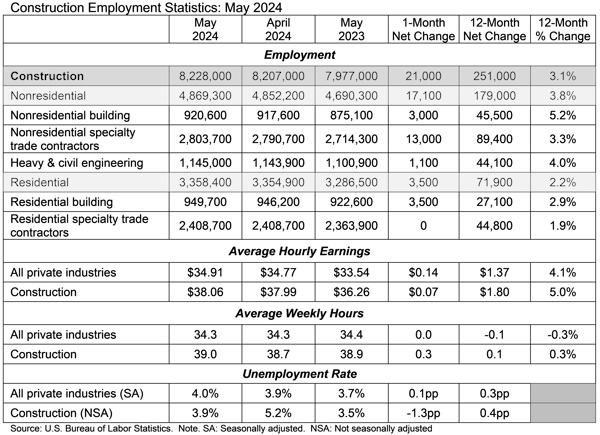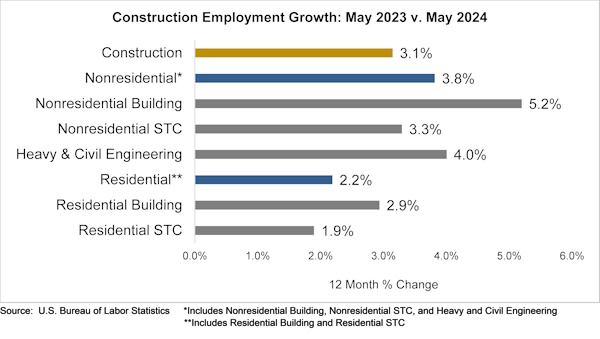WASHINGTON (June 7, 2024) — The construction industry added 21,000 jobs on net in May, according to an Associated Builders and Contractors (ABC) analysis of data released today by the U.S. Bureau of Labor Statistics. On a year-over-year basis, industry employment has increased by 251,000 jobs, an increase of 3.1%.
Nonresidential construction employment increased by 17,100 positions on net in May, with growth registered in all three major subcategories. Nonresidential specialty trade added the most jobs, with employment increasing by 13,000 positions. Nonresidential building and heavy and civil engineering added 3,000 and 1,100 jobs, respectively.
The construction unemployment rate fell to 3.9% in May. Unemployment across all industries rose from 3.9% in April to 4.0% last month.
“Every monthly employment report is important,” said ABC Chief Economist Anirban Basu. “But this year’s reports are scrutinized carefully for several reasons, including upcoming federal elections. Economists are asking whether indications of softening in certain parts of the economy might cause deterioration in the overall labor market and whether the virtuous cycle of consumer spending and job growth will persist. May’s report indicates that we remain in that virtuous cycle.
“Despite perpetual fears of recession and the dislocating impacts of high borrowing costs, the U.S. nonresidential construction industry is adding jobs rapidly and will continue to, according to ABC’s Contractor Confidence Index,” said Basu. “While many would point to public infrastructure outlays as an obvious source of strength, this report indicates job growth among many industry segments. The rapid transformation of the U.S. economy continues to more than offset the negative impacts of elevated project financing costs.
“As always, the news was not purely positive,” said Basu. “Wage pressures picked up in May, likely quashing hopes for a Federal Reserve rate cut in July. While the establishment survey indicated that the nation added 272,000 jobs in May on a seasonally adjusted basis, blowing through consensus expectations, the household survey indicated that the nation’s unemployment rate increased despite a shrinking U.S. labor force. What that means is that the headline job growth number emerging from the establishment survey may be overstating U.S. economic strength while also delaying the Federal Reserve’s response to potentially emerging economic weakness.”


